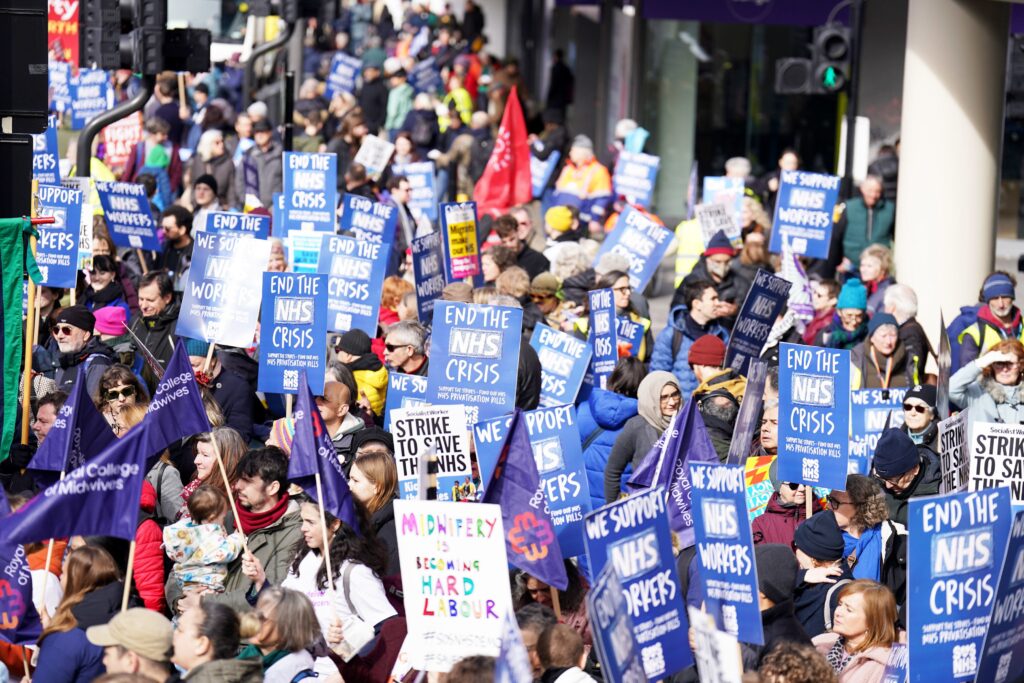
The government and unions have agreed on an NHS pay proposal and urged workers to accept it, potentially ending strikes that have disrupted the healthcare system for months.
The long-running dispute has led to a series of walkouts by nurses, ambulance crews, paramedics, hospital porters and other health workers.
The government has offered a permanent 5% pay rise for 2023/24 and an “additional lump sum” for this year. Unions generally sought wage hikes more in line with spiralling inflation, which has been near 10%.
The proposed deal means a newly-qualified nurse would get an extra £1,800 this year on top of the existing deal, and a pay rise of more than £1,300 next year.
The additional one-off lump sum for 2022-23 rises in value up the NHS pay bands, so is worth around £1,600 for staff at the bottom of band two (for example porters, cleaners and healthcare assistants) and close to £3,800 for staff at the top of band nine.
The new agreement would cover 1 million nurses, paramedics, midwives and other workers in England for two years through to early April 2024.
The strikes will end only if members approve the deal after a period of consultation by trade unions. After those talks, the proposals will be put to members to vote on.
Three of the unions – Unison, GMB and the Royal College of Nursing – said they recommended their members accept the offer, arguing that while it did not address all of their concerns, it did represent progress. Unite was unable to recommend the offer, but did not give a specific reason for this decision.
Ambulance members of Unison and Unite were due to strike next Monday, and physiotherapists were going to walkout later this month, but the action has now been called off.
Unison’s head of health Sara Gorton said: “It’s a shame it took so long to get here.
“If accepted, the offer would boost pay significantly this year and mean a wage increase next year that’s more than the government had budgeted for.
“This is better than having to wait many more months for the NHS pay review body to make its recommendation.”
Rachel Harrison, GMB national secretary, said: “GMB members should rightly be proud of themselves. It’s been a tough road but they have faced down the Department of Health and won an offer that we feel is the best that can be achieved at this stage through negotiation.
“If the offer is accepted then it would meet a key GMB demand of a huge pay uplift for the lowest paid to keep them well above the Real Living Wage.”
RCN general secretary Pat Cullen said: “The government was forced into these negotiations and to reopen the pay award as a result of the historic pressure from nursing staff.
“Members took the hardest of decisions to go on strike and I believe they have been vindicated today.
“After tough negotiations, there are a series of commitments here that our members can see will make a positive impact on the nursing profession, the NHS and the people who rely on it.”
Health secretary Steve Barclay said “balance was required on both sides” to reach an agreement.
Prime minister Rishi Sunak said the deal is “affordable for the taxpayer and continues to deliver on my promise to halve inflation”.
“Both sides have worked together to reach a settlement”
Health Secretary Steve Barclay says the pay offer for NHS staff in England is “both affordable to the wider taxpayer” and “balances the very real pressures we recognise NHS workers have been on” https://t.co/T5fs0H7xt0pic.twitter.com/F0goMrir8w
— BBC Politics (@BBCPolitics) March 16, 2023
The agreement is curiously-timed, coming a day after the government’s budget where no mention was made of a new settlement. It also leads to questions about the government’s claim that meeting demands for pay that better reflected double-digit inflation would only risk driving prices higher.
No overall cost to the public purse was provided, but ministers said they could guarantee there will be no impact on frontline services as the result of the pay offer. The GMB said the government has put an extra £2.5 billion on the table.
The Institute for Fiscal Studies think tank said the latest pay deal would see NHS pay grow slightly faster than inflation in the coming financial year, and details of the government’s funding for the offer remained hazy.
“It is unclear whether the Treasury will eventually provide the funding required to cover the cost of this deal,” IFS Senior Research Economist Ben Zaranko said.
“If it did, that would be a material alteration to the spending plans contained in this week’s budget before the ink is dry.”



Stay in touch and up to date with your industry news… Always be a step ahead with BBK Services…
join newsletter now ⤵
